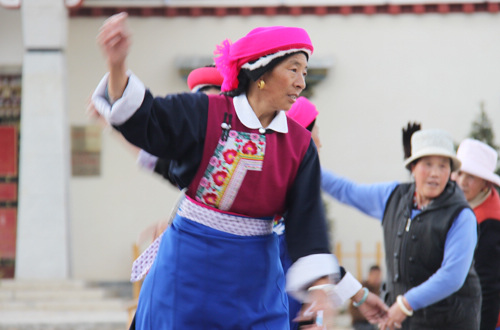|
 |
|
EVENING EXERCISE: The old city's elderly women gather in a large open square for exercises before the sun fully retreat behind the hills (BRANDON TAYLOR) |
I was standing in paradise, or at least that's what the guidebook I had so blindly followed said. As I scanned my surroundings, I felt duped. How could this be Shangri-la, that ancient utopia of perfection and youth?
To my left were barren, brown plains. A few shrubs dotted the otherwise lifeless landscape. My right was more promising: a yak chomped away at what little grass it could find, stomping its feet angrily in protest at my intrusion of its turf before losing interest and continuing its meal. On the tops of the hills nearby, a rainbow array of prayer flags fluttered in the wind.
Paradise. Where?
Really, I wasn't too upset. This wasn't the real Shangri-la. This was Shangri-la with Chinese characteristics, a city once called Zhongdian located on the Tibetan Plateau in southwest China's Yunnan Province. The name was changed in 2001 after a local official thought rebranding would draw in tourists—and it worked.
If anything, I was confused and annoyed. Renaming this place after a fabled city seemed inappropriate. You wouldn't rename Detroit, an American city synonymous with poverty, as El Dorado, the legendary city of gold.
But what this faux Shangri-la lacked in scenery and greenery it made up for in its population of Tibetans, their culture and their food.
The Shangri-la I was visiting was nestled between small hills, an oasis of civilization in an otherwise inhospitable land. A few Tibetan stupas and temples with endless streams of prayer flags stood watch over the city. In Shangri-la's old city streets, the Tibetan populace went about its daily routines: carving wood, weaving tapestries and selling statues, chopsticks and necklaces made of yak bones to eager tourists. At the city's eateries I indulged in the local fare of yak dumplings, yak kebabs, yak steak, noodles with yak, yak cetera.
As entertaining as Shangri-la's old city was, the Tibetans and Tibetan culture I had hoped to find were kilometers away, across endless fields and yak-guarded territory in tiny farming communities. I'd need a guide to find these, so I found one and the next day we were off.
For nearly two hours we walked across a monotonous landscape finally reaching a small Tibetan village at what I was convinced was the very fringe of civilization. Cows and pigs wandered about unattended, their masters nowhere to be found.
When we finally bumped into a young Tibetan woman, she warmly welcomed us into her home for yak butter tea and yak cheese. While I wanted to see what a typical Tibetan domicile looked like, my stomach churned at the combination of the words "yak", "butter" and "cheese."
Like the landscape outside, the Tibetan family's house was void of anything fancy or modern. The latest technology they had was a retro-television set with rabbit-ear antennae atop a large chest of drawers in a dusty corner. A large wooden pole in the middle of the main chamber held up the roof. The uncarpeted wooden floor creaked as I was ushered across it to two benches next to a large cast iron stove.
The family—consisting of the woman we met outside, her mother and her grandmother—made chit-chat with the guide as each one took turns tending to the youngest woman's child. Other villagers dropped by after receiving word that a foreigner was in the neighborhood. I couldn't blame them—I was an oddity here with my backpack, jeans, and chalk white skin compared to their darker complexions and traditional garb of purple, black and blue.
Then out came the tea and cheese. I tasted sparingly, holding the teacup in my hands and moving it to my mouth every so often to create the facade of drinking. With each sip, I smiled and received smiles of approval from the family. When I finally worked up the courage to take a sip, I was surprised by the taste. It was good, rich in flavor and not as heavy as I'd imagined. The cheese was bitter, and I took one bite before putting it down.
When it came time to leave, one of the women showed us the milk-producing yak, smacking it proudly on the rear.
On the way out of the village, we saw Tibetan farmers harvesting wheat. A woman sat watching over a group of furry, black pigs as they basked in the sun. An old man carved away at a long wooden beam for a house that was taking shape nearby.
No one was busy checking updates on iPhones; no one had satellite dishes on the roofs of their homes; and no one seemed to care too much about a foreigner wandering around their town. They were engrossed in living simple lives, disconnected from the busy outside world. So maybe this place really was paradise.
The author is an American living in Beijing | 